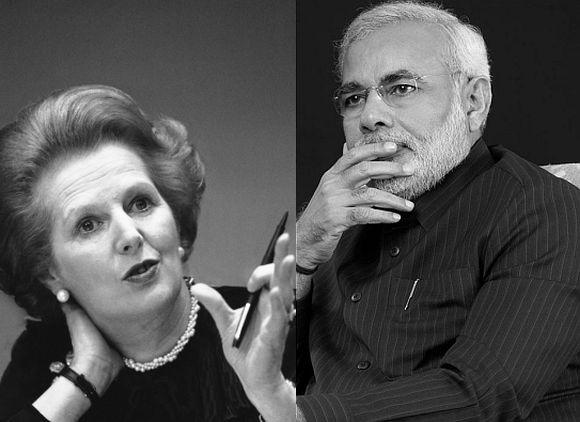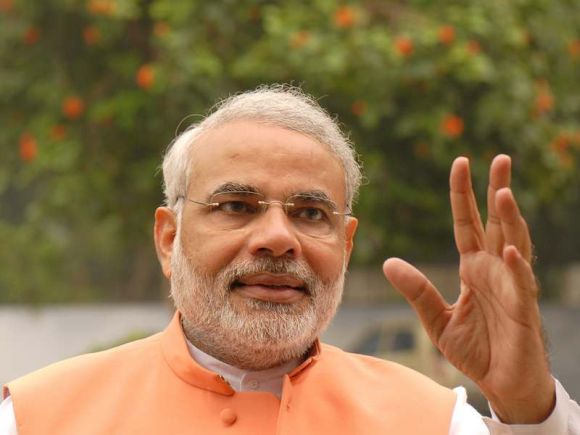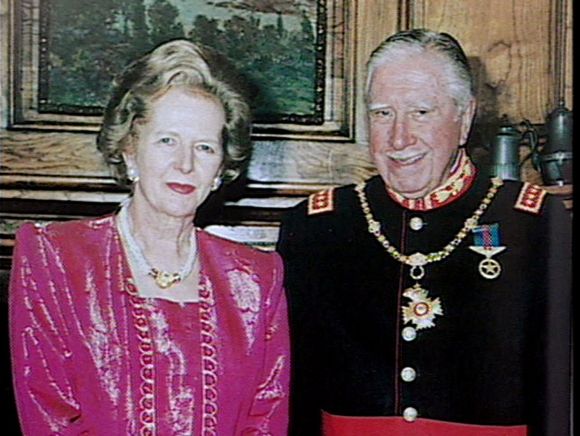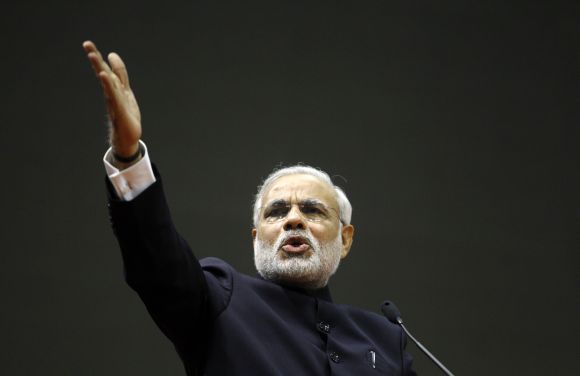Vivek Dehejia
What ties together Thatcher and Modi is that their respective economic and political approaches are rigged in controversy, notes Vivek Dehejia.
Narendra Modi was giving a speech extolling the twin virtues of small government and efficient governance at the very moment that news of the death of Margaret Thatcher was breaking. Modi, like Lady Thatcher, is no stranger to controversy. Indeed, each in their own way has been -- and continues to be -- one of the most polarising politicians in India and the United Kingdom, respectively.
Idolised by the right and pilloried by the left, Thatcher presided over a wholesale remaking of the British economy during her tenure as prime minister, rolling back the welfare state that had been created in the aftermath of the Great Depression and World War II, and introducing the world to the concept of privatising state-owned enterprises.
Her mantra was subsequently taken up by American President Ronald Reagan, a similarly polarising figure in the United States.
Vivek Dehejia is an economics professor at Carleton University in Ottawa, Canada, and co-author of "Indianomix: Making Sense of Modern India" (Random House India, 2012).
Please ...
The notorious link that Modi and Thatcher share
The controversies that dog Modi have less to do with economics, although his critics contest claims about Gujarat's good economic performance during his tenure, pointing to faltering social indicators that lag behind the state's rapid economic growth.
Rather, the question of Modi's complicity, or connivance, in the communal violence of 2002, in which more than 1,000 people, mostly Muslims, were killed, is the abiding source of the unease that Gujarat's chief minister generates.
While he has not been convicted by any court, suspicions remain regarding Modi's possible involvement in what many scholars consider a pogrom of Gujarat's Muslims.
Please ...
The notorious link that Modi and Thatcher share
Image: Margaret Thatcher and Augusto Pinochet in this 1994 photographPhotographs: Reuters
There's another peculiar synchronicity that ties together Modi and Thatcher. The latter was famously, or notoriously, a defender of Augusto Pinochet, the brutal dictator of Chile under whose watch thousands of opponents of the regime "disappeared" or were killed outright.
Thatcher, of course, didn't support Pinochet for the brutality of his regime, but rather for his staunch support of pro-market economic policies (and corresponding antipathy to the Soviet Union) that helped turn the Chilean economy around and bring it back from the brink.
Today, for better or worse, Chile is the healthiest and most robust economy in Latin America, and even Pinochet's critics will have to concede that his economic policies, enforced at the barrel of a gun, have played their role in bringing this about.
So, what does this have to do with Modi? Simply this: the fact that liberal economic policies in Chile were promoted under the aegis of a bloody and undemocratic regime tarnished the cause of sound economics in Latin America for more than a generation. For good or ill, many Latin Americans associated market-friendly economic policies with the decidedly unsavoury cast of the Pinochet regime, and gave them a wide berth.
Please ...
The notorious link that Modi and Thatcher share
Photographs: Reuters
By the same token, in India today, the only credible politician with any sort of a mass following, who is making a case for smaller government yoked to better governance, is Modi. I
Indeed, he is making the case well. In his speech to the "Think India" dialogue in New Delhi on Monday -- the same day on which Thatcher died -- Modi took a leaf from advocates of minimal government in the US and Britain and made a nuanced and persuasive case that Indian government is dysfunctional and in need of reform.
Modi's examples were earthy and effective. He pointed out, for instance, that many well-to-do Indians rely on private security because they do not trust the police. Yet, the provision of internal security through the police forces is one of the most basic prerequisites for the most minimal of governments, the "night watchman" state favoured by Adam Smith and other classical liberal economists and their libertarian offspring.
Clearly, Modi seemed to suggest, a bloated government which runs record fiscal deficits and yet is not able to provide credible policing has failed critically.
In the folksy and down-home style that endears him to his many supporters, Modi spelled out what in many ways would be considered a standard rightist critique of excessive government in India. Government has to do with "outlay", he explained, while governance has more to do with "outcome".
What is missing, in his view, is a systematic assessment of the socio-economic costs and benefits of economic policy, to which a market-oriented economist or policy analyst could add only a cry of approbation.
Yet, in India, unlike in the US or Britain, Modi is just about the only politician speaking such language. He, thus, creates the aspiration among his supporters, and those still sitting on the fence, that India under his putative leadership would, indeed, move toward a leaner and more efficient government that would empower, rather than shackle, its people. He also creates a dilemma for those for whom his economics resonate, but his politics evoke repugnance.
In the event that he does becomes the nation's next prime minister -- an eventuality far from certain, but increasingly a serious probability -- which Modi will ensconce himself at 7 Race Course Road?
Will he be the chauvinistic, divisive leader who presided over one of the worst episodes of communal violence that India has witnessed in its recent history? Or, will he morph into a paragon of good governance, small government, and market-friendly economics that will help power India's economic rise?






article